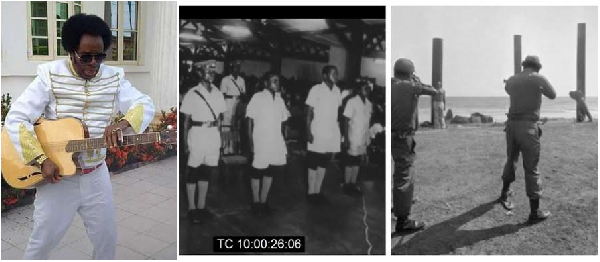Guitars and Guns: The incredible story of Victor Uwaifo’s ‘Guitar Boy’ and the failed coup of 1967

Everyone remembers the coup of 1966, which saw the government of Dr. Kwame Nkrumah overthrown and the establishment of the National Liberation Council (NLC).
Everyone also remembers the coup of 1972, which saw J.A. Busia take over.
But how many remember the failed coup of 1967 and the song that was associated with it?
In 1966, Victor Uwaifo, a Nigerian musician, sculptor, and inventor, released his hit track ‘Guitar Boy’.
The song, categorised as African Highlife, was popular for its catchy melody, danceable beat, and simple lyrics which included the chorus,
If you see mammy water o
If you see mammy water o
Never, never you run away
Ay, ay
Sing that song of love, sweet melody
Guitar Boy
Guitar Boy
But little did anyone know that a dance song would become the catalyst for a bloody night.
In April 1967, a coup attempt, infamously known as ‘Operation Guitar Boy’, was led by Lt. Samuel Arthur, Lt. Moses Yeboah, and Second Lt. Ebenezer Osei-Poku.
The coup was marked by the tragic deaths of two officers, including Lt. General Emmanuel Kotoka, a member of the ruling National Liberation Council and the head of Chief of Defence Staff, who was killed by Lt. Moses Yeboah.
According to theculturenewspaper.com, Lt. Yeboah had tracked down Lt. Gen. Emmanuel Kwasi Kotoka at the Accra Airport and killed him and his orderly, Sgt. Osei Gunshie.
Elsewhere, Captains A.K. Avevor and C.Y. Borkloe were murdered.
Satisfied with their action, Lt. Arthur had marched into Broadcasting House Accra, announced the coup, and slotted in Uwaifo’s hit track, Guitar Boy.
He then dashed to his girlfriend’s house to find out if she heard his voice on the radio announcing the take-over.
However, loyal soldiers quickly put down the mutiny, and the leading mutineers, Lt. Samuel Arthur and Lt. Moses Yeboah, were executed by firing squad while Second Lt. Ebenezer Osei-Poku was sentenced to 30 years in prison.
In an ironic twist, the song was banned in Ghana by the National Liberation Council (NLC).
Despite the ban of ‘Guitar Boy’ in Ghana, Uwaifo’s legacy continued to flourish with more hit tracks and international recognition.
His track ‘Joromi’ won a Gold Disc in 1966, the first for an African musician.
He was honoured with the Member, Order of the Niger award in 1981 by President Shehu Shagari of Nigeria.
He was also known for other exploits, including stunts like rotating his guitar 360 degrees while it hung on his neck and designing a car from fibreglass.
Victor Uwaifo died on August 28, 2021, due to COVID-19 complications. His death was a loss to the world of music and art.
‘Guitar Boy’ – Victor Uwaifo.
This song was banned in Ghana by the NLC afte ‘Operation Guitar Boy’ failed in 1967 pic.twitter.com/YmD6hmEscA
— HIGHLIFE lives ON (@GyapKay) June 14, 2024
Source: www.ghanaweb.com





